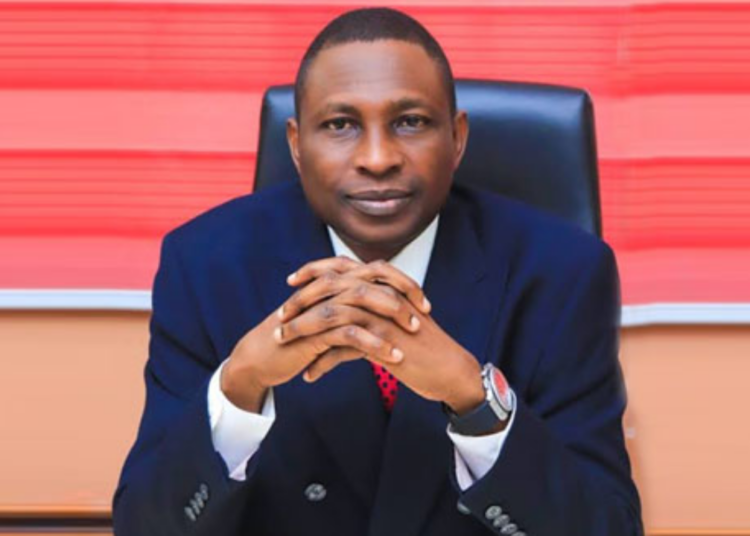As Nigeria welcomes its new Economic and Financial Crimes Commission (EFCC) Chairman, Ola Olukoyede, the nation finds itself at a critical juncture in its ongoing battle against corruption.
The appointment of Olukoyede comes after a tumultuous period that saw the sack of Mr Ibrahim Magu who had become the hunted and the suspension of Abdulrasheed Bawa.
This transition underscores the gravity of the challenges ahead and the imperative for the new leadership to be resilient, innovative, reinvent and rededicate itself to the task at hand which is to cleanse the nation of stupefying corruption especially in the public sector.
Nigeria’s battle against corruption is not a new one. Since the inception of the EFCC, no chairman has been able to complete a full tenure. This highlights the inherent difficulties of the role, often referred to as a “poisoned chalice.”
Nevertheless, it is imperative that Olukoyede and his team rise to the occasion. They have their work cut out for them, considering the recent findings that paint a grim picture of Nigeria’s corruption landscape.
It is instructive to note that Transparency International’s 2022 Corruption Perception Index, where Nigeria ranked 150 out of 180 countries with a score of 24 out of 100, is a stark reminder of the persistence of corruption in the nation.
Although the score remained unchanged from the previous year, the slight improvement in ranking from 154 to 150 offers a glimmer of hope. It suggests that, while progress has been slow, there is potential for change.
A critical report from the Open Society Foundation in September 2023 highlighted Nigeria’s profound challenge: the interplay between democracy and corruption. This interconnection poses a significant obstacle to the country’s growth and development, undermining the very essence of democracy.
In the considered opinion of this newspaper, it is clear that corruption in Nigeria extends its insidious reach into the heart of the political system, stifling the nation’s progress.
Furthermore, a study by the Human and Environmental Development Agenda (HEDA) Resource Center reveals the alarming cost of illicit financial flows (IFF) to Nigeria’s economy.
The country has been losing an estimated $15 to $18 billion annually due to IFF. This amount accounts for about 30 percent of Africa’s total loss, which stood at $50 billion over the last decade.
Pointedly, the rise in corrupt practices only exacerbates these financial losses, making it crucial for the new EFCC chairman to address this issue.
The first and foremost challenge for Olukoyede is to rebrand the EFCC. The agency’s tactics, such as breaking down doors and windows in the dead of night, are not only primitive but also detrimental to its credibility and effectiveness.
This aggressive approach must be replaced with more sophisticated and lawful investigative methods.
One area where the EFCC has faltered is in its legal battles involving politically exposed individuals. The agency has lost several cases due to the poor presentation of evidence and a tendency toward media trials.
To regain public trust and achieve successful prosecutions, the EFCC must focus on a thorough, meticulous approach to investigations and legal proceedings.
To chart a path forward in combating corruption, Nigeria can draw lessons from Singapore,Rwanda and Hong Kong that have successfully reduced corruption levels.
These nations have employed a combination of strategies, policies, and societal initiatives to create a more transparent and accountable governance system.
In our view to emulate these success stories, Nigeria should invest in building robust and independent institutions responsible for investigating and prosecuting corruption cases, such as the EFCC. These institutions should operate with transparency and accountability.
The government and political leaders must demonstrate a genuine commitment to eradicating corruption. This commitment should be visible through policy reforms, legal frameworks, and actions taken against corrupt officials.
Encouraging a culture of ethics, transparency, and accountability among the populace is vital. Public awareness campaigns and educational initiatives can help change the societal mindset regarding corruption.
Collaboration with international organisations and foreign governments can facilitate the tracking and recovery of illicitly acquired assets and funds.
In view of the foregoing , as the new EFCC Chairman takes on the enormous task of combating corruption, he must recognise the enormity of the challenge ahead. Lessons from other nations that have successfully reduced corruption can guide Nigeria’s efforts.
By rebranding the EFCC, improving legal proceedings, and fostering a culture of transparency and accountability, Nigeria can hope to make substantial progress in its battle against corruption. The stakes are high, and the nation’s future depends on the effectiveness of this fight.





